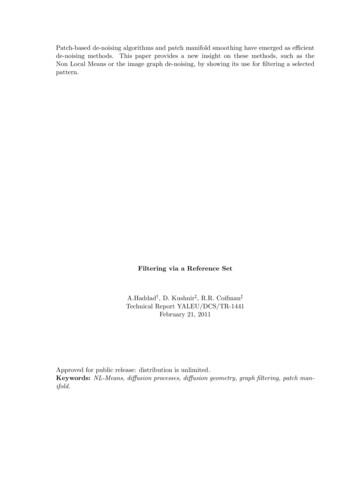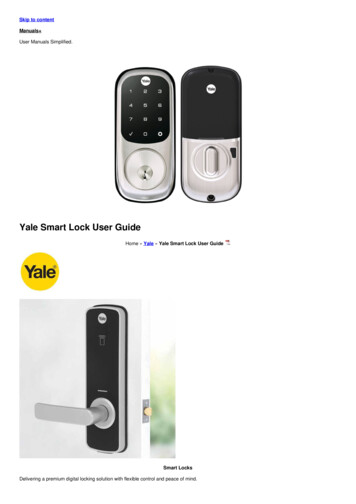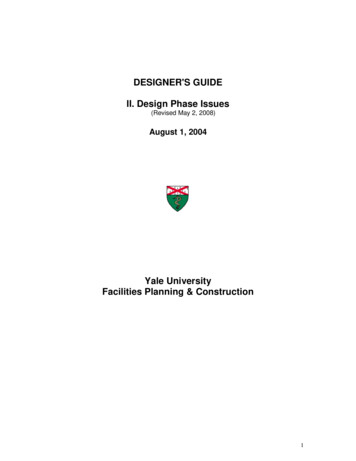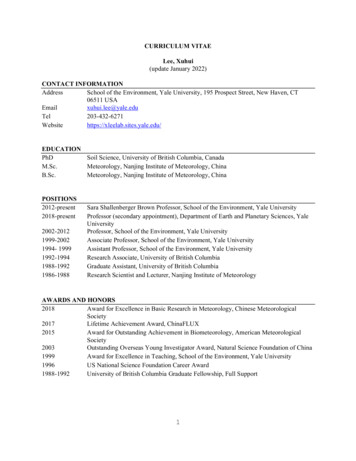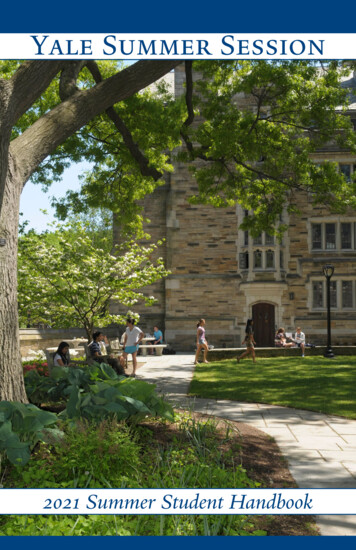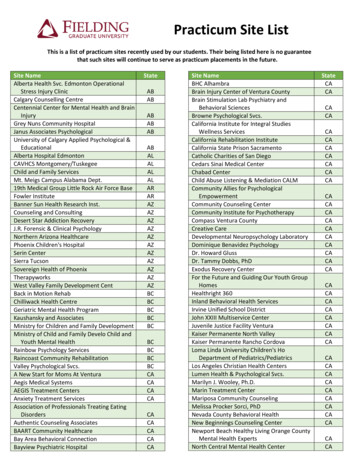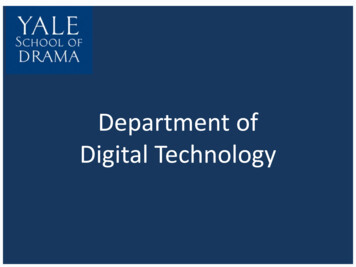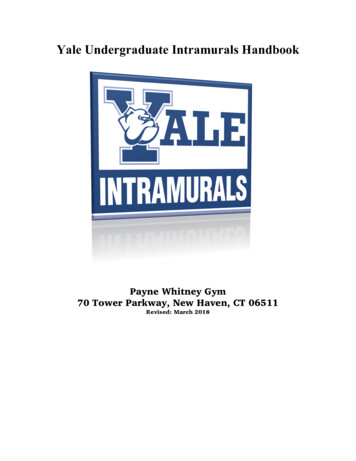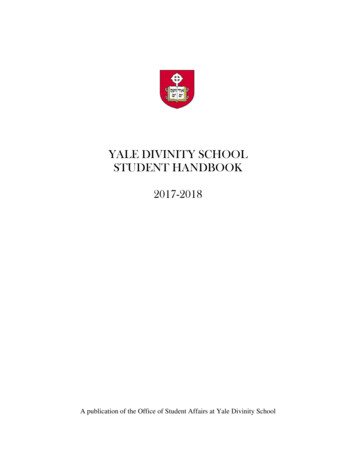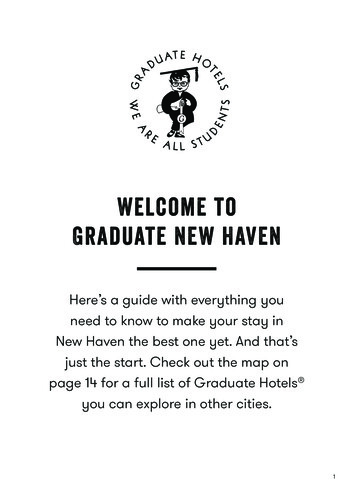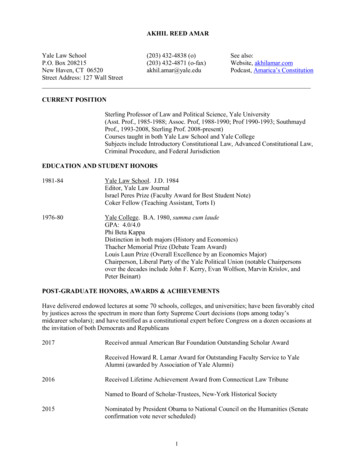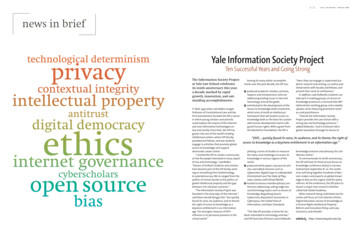
Transcription
23yale law report summer 2008news in briefYale Information Society ProjectTen Successful Years and Going StrongThe Information Society Projectat Yale Law School celebratesits tenth anniversary this year,a decade marked by rapidgrowth, innovation, and outstanding accomplishments.It was 1997 when Jack Balkin, KnightProfessor of Constitutional Law and theFirst Amendment, founded the ISP, a venuein which young scholars and activistscould explore the impact of the Internetand new information technologies onlaw and society. Since then, the ISP hasgrown into one of the world’s leadingintellectual centers, where ISP faculty,postdoctoral fellows, and law studentsengage in activities that promote globalaccess to knowledge and supportdemocratic values online.“I started the ISP to create a communityat Yale for people interested in every aspectof law and technology,” said Balkin.“Dozens of brilliant students and scholarshave become part of the ISP family, working on everything from biotechnologyto cyberdemocracy. We’ve ranged from thepolitics of virtual worlds to the politics ofglobal intellectual property and the gapbetween rich and poor countries.”“The Information Society Project wasfounded in the early days of the Internet,”said Dean Harold Hongju Koh, “but quicklyfound its voice, its audience, and its theme:the right of access to knowledge as akeystone entitlement in an informationage. The strongest measure of ISP’sinfluence is its pervasive presence in thevirtual world.”Among its many stellar accomplishments over the past decade, the ISP has:produced academic scholars, activists,lawyers, and entrepreneurs who areaddressing leading issues in law andtechnology around the globe.contributed to the development of theAccess to Knowledge (A2K) movement,which aims to build an intellectualframework that will protect access toknowledge both as the basis for sustainable human development and to safeguard human rights. With a grant fromthe MacArthur Foundation, the ISP is“Here, they can engage in supervised academic research and writing, co-author published works with faculty and fellows, andpresent their work at conferences.”In addition, said DeNardis, students cantake part in reading groups, an Access toKnowledge practicum, a Harvard-Yale-MITCyberscholar working group, and a weeklyspeaker series featuring prominent scholars and practitioners.“Overall, the Information SocietyProject provides the Law School with astrong law and technology presence,”added DeNardis, “and it enhances Yale’sglobal reputation through its Access to“(ISP) . quickly found its voice, its audience, and its theme: the right ofaccess to knowledge as a keystone entitlement in an information age.”piloting a series of studies to measurethe status and challenges to access toknowledge in various regions of theworld.produced white papers, law journal articles, and edited volumes such asCybercrime: Digital Cops in a NetworkedEnvironment and The State of Play:Laws, Games, and Virtual Worlds.hosted numerous interdisciplinary conferences addressing cutting-edge lawand technology topics such as Access toKnowledge, Regulating Search,Cybercrime, Reputation Economies inCyberspace, the Global Flow ofInformation, and Open Standards.“The Yale ISP provides a home for students interested in technology and law,”said ISP Executive Director Laura DeNardis.Knowledge activism and advocacy for civilliberties online.”To commemorate its tenth anniversary,the ISP will host its third annual Access toKnowledge conference (A2K3) in Geneva,Switzerland, September 8–10. The conference will bring together hundreds of decision-makers and experts on global knowledge to discuss the urgent need for policyreforms. At the conference, the ISP plans tolaunch a major new research initiativecalled A2K Global Academy.Other research being undertaken by thecenter will focus on Civil Liberties Online;Digital Education; Access to Knowledge asa Human Right; Intellectual PropertyReform and Innovation Policy; and Law,Genomics, and eHealth.http://www.law.yale.edu/isp
4news in brief5yale law report summer 2008the environmentYale Center for Environmental Law &Policy Releases 2008 EnvironmentalPerformance IndexAppointmentsWalton Hale Hamilton Professor ofLaw in December 2007. ProfessorMeares is a scholar of criminal lawpolicy and criminal procedure whosework is aimed at reducing crime. Shehas been a member of the Yale LawSchool faculty since January 2007.Prior to joining Yale Law School, shetaught at the University of ChicagoSchool of Law for twelve years. At thetime of her appointment, Dean Kohnoted that “Tracey Meares has established herself as one of the mostinsightful commentators on race,crime, and the law.” Thomas W. Merrill, a specialist in Douglas Kysar, a visiting professor Scott J. Shapiro ’90 joined the Yaleproperty, environmental law, admin- at Yale Law School in 2005, willLaw School faculty in July as a profesistrative law, eminent domain, andbecome a full-time member of thesor of law and philosophy. Shapirothe U.S. Supreme Court, has joinedfaculty in fall 2008. Kysar comes towas a visiting professor at Yale LawYale Law School as Professor of Law.the Law School from Cornell LawSchool from 2002 to 2003. He comesProfessor Merrill served as SidleySchool and the UCLA School of Law.to Yale from the University ofAustin-Robert D. McLean ’70 VisitingHis scholarship focuses mainly onMichigan’s Law School and philosoProfessor of Law at Yale Law School in environmental law and products liaphy department, where he held athe fall of 2007. Prior to that, he wasbility. At YLS, he will teach a section of joint appointment. Prior to Michigan,the Charles Keller Beekman Professor Torts in addition to courses on TheShapiro taught for nine years at theof Law at Columbia University. Merrill Law of Climate Change andBenjamin N. Cardozo School of Lawwill teach Legislation and Property at Constitutions and the Environment.and has also taught at Trinity CollegeYLS this year.“In a few short years, Professorin Dublin, the Central EuropeanDean Koh said, “Tom Merrill is aDoug Kysar has emerged as the most University in Budapest, and Columbiascholar-lawyer of unusual breadthexciting new voice in domestic andUniversity. His areas of specialtyand influence. He is that rare legalinternational environmental law,”include jurisprudence, criminal law,academic who leads four fields: prop- said Dean Koh. “Unlike those who pre- constitutional law and theory, anderty and natural resources law,maturely proclaim the death of envifamily law. He will teach Criminal Lawadministrative law, environmentalronmentalism, Professor Kysar would and Administration at Yale this year.law, and Supreme Court practice. Inbuild from the bottom up, invokingDean Koh said, “Yale Law Schoolbringing Tom to Yale, we welcomeprinciples of precaution and sustainhas had a distinguished tradition inone of the very few legal scholarsable development to promote a more legal philosophy and jurisprudence,who can both argue and win abroadly participatory process of envi- dating back to Wesley NewcombSupreme Court case and write a lead- ronmental lawmaking.”Hohfeld, the Realists, and Ronalding law journal article analyzing theDworkin, and continuing with theplace of that critical Supreme Courtmodern work of Jules Coleman, anddecision in the legal doctrine. Perhapsmany members of our currentbest of all, he is also an exemplary citfaculty That tradition has now beenizen, who has been the heart of everyimmeasurably deepened by thelaw faculty on which he has sat.”arrival of Scott Shapiro, who is widelyrecognized as the leading youngscholar in the country currently working in the field of jurisprudence.”Greenhouse photograph by Jamie Rose Tracey L. Meares was named Nicholas Parrillo ’04 joins the Yale Pulitzer Prize-winning legal reporterLaw School faculty this year asAssociate Professor of Law. He willteach in the fields of AdministrativeLaw and American Legal History.A member of the New York bar,Parrillo received his J.D. in 2004 fromYale Law School, followed by a clerkshipwith Judge Stephen F. Williams of theU.S. Court of Appeals for the D.C. Circuit.He received his M.A. in AmericanStudies from Yale University in 2001and expects to receive his Ph.D. fromYale in 2009 for his dissertation on TheRise of Non-Profit Government inAmerica.Said Dean Koh, “We are delighted towelcome back Nick Parrillo, an extraordinarily promising young legal historian, who will join Bruce Ackerman, BobGordon, Owen Fiss, John Langbein,Robert Post, Reva Siegel, Jim Whitman,and many others of our faculty whocomprise the deepest collection of legalhistorians at any law school.”Linda Greenhouse ’78 msl will returnto Yale Law School in January 2009 asthe Knight Distinguished Journalist-inResidence and Joseph M. GoldsteinSenior Fellow. In that capacity, she willlecture, do research, offer advice on thenew Law and Media Program, and participate in various Law School activities,including the Supreme Court Clinic.For the past three decades,Greenhouse has covered the U.S.Supreme Court for The New York Timesand has received numerous awards forjournalism, including the Pulitzer in1998. Her biography of Justice HarryBlackmun, Becoming Justice Blackmun,was published in 2005 and named aNew York Times Book Review NotableBook.Dean Koh said, “We are thrilled towelcome Linda Greenhouse back hometo Yale Law School, whose spirit ofhumanity and excellence she embodies.For three decades, she has been notonly the nation’s most respected legaljournalist, but also the world’s teacheron the complex workings of the UnitedStates Supreme Court.”The 2008 Environmental Performance Index (EPI) wasreleased January 23 at the annual meeting of the WorldEconomic Forum in Davos, Switzerland. The index measures the environmental performance of various countriesbased on established targets. It is produced by the YaleCenter for Environmental Law & Policy—a joint initiativeof Yale Law School and the Yale School of Forestry andEnvironmental Studies—and Columbia University’s Centerfor International Earth Science Information Network, incollaboration with the World Economic Forum and theJoint Research Centre.In this latest EPI, 149 countries were ranked on 25 indicators tracked across six categories: Environmental Health,Air Pollution, Water Resources, Biodiversity and Habitat,Productive Natural Resources, and Climate Change.Switzerland scored highest, while the United States placed39th.“The ability to benchmark performance provides animportant spur to lagging performers and valuable guidance on where to look for best practices,” said ProfessorDaniel C. Esty ’86, director of the Yale Center forEnvironmental Law & Policy. “Every country has somethingto learn from the 2008 EPI.”http://epi.yale.edu
6news in brief7yale law report summer 2008awardsInterest Fellowship and Fund at YaleLaw School and a co-chair of The YaleWomen Faculty Forum.Awards for Our Facultyin interpreting the Constitution.“Induction into the AmericanAcademy signals rare scholarly preeminence,” said Yale Law SchoolDean Harold Hongju Koh. “RevaSiegel’s election marks her pathbreaking scholarly role in constitutional law, legal history, and understanding constitutional change asdriven by popular constitutionalismoutside the courts.”The China Law Center recently co-hosted aworkshop on anti-discrimination law at SichuanUniversity Law School.China Law CenterCo-Hosts WorkshopsThe China Law Center co-hosted workshops on anti-corruption law and anti-discrimination law this past January. The anticorruption conference—“ConstructingLegal Institutions for Anti-Corruption”—was in cooperation with PekingUniversity’s Administrative andConstitutional Law Research Center.Susan Rose-Ackerman, the Henry R. LuceProfessor of Jurisprudence at Yale LawSchool, led a delegation of U.S. experts,which also included Nancy Boswell, president of Transparency International-USA;Peter Clark, a former senior Department ofJustice lawyer and partner of Cadwalader,Wickersham & Taft; Professor AlasdairRoberts of Syracuse University; ProfessorMelanie Manion of the University ofWisconsin-Madison; and China Law CenterDeputy Director Jeffrey Prescott ’97.During the two days of discussion, participants—including top scholars, policymakers, judges and prosecutors fromChina—focused on institutional and legalsolutions for anti-corruption reform, drawing on China’s recent experience andefforts in the United States, Hong Kong,Singapore, and Taiwan. Among the issuesdiscussed were transparency, the need forinstitutional independence, administrativeand regulatory reforms, the role of themedia, and other reforms which mighthelp check or prevent corruption.On the heels of the anti-corruption conference, the Center co-hosted a workshopon anti-discrimination law at SichuanUniversity Law School. The conferencebrought together more than fifty leadingChinese experts and officials representingkey government ministries in what wasthe largest workshop ever held on issues ofanti-discrimination law in China.The delegation of foreign expertsincluded Jack Balkin, Knight Professor ofConstitutional Law and the FirstAmendment at Yale Law School; StuartIshimaru, Commissioner of the U.S. EqualEmployment Opportunity Commission;and Reva Siegel ’86, Deputy Dean and theNicholas deB. Katzenbach Professor of LawThis winter, the China Law Centermoved to a new address just acouple of blocks from the LawSchool, at 254 Elm Street. TheCenter’s new facilities includeincreased office space and a confer ence room.and Professor of American Studies at YaleUniversity. China Law Center Director andPotter Stewart Professor of ConstitutionalLaw Paul Gewirtz ’70 led the delegation.Participants discussed the current stateof discrimination law in China, exploredinsights from the U.S. experience, andhelped suggest an agenda to continue toadvance anti-discrimination reform.www.yale.edu/chinalawclarificationIn the Winter 2008 issue of theYale Law Report, the story “One LawClinic, Two Cities” stated that theElm City Resident Card program wasone of six ideas proposed by a YLSclinic. Though Law School studentsdrafted a report that proposed theID card program, the idea for theprogram originated with a suggestion by Fair Haven resident AntonioArmas during a community meeting.Additionally, the Law Reportwould like to clarify that it was theCommunity Lawyering Clinic thathelped research the idea for themunicipal ID program and theCommunity Development FinancialInstitutions Clinic that representedthe city in preparing and presentinga grant proposal that helped fundthe first year of the ID card program.China Law Center office photograph by Harold Shapiro; Pollan photograph by Ken Lightchina Nicholas deB. Katzenbach Arthur Liman Professor of LawProfessor of Law Reva Siegel ’86 hasbeen elected to the AmericanAcademy of Arts & Sciences, one ofthe nation’s oldest and most prestigious honorary societies and independent policy research centers.Considered leaders in their field, the190 new Fellows were chosen fromthe sciences, the arts and humanities,business, public affairs, and the nonprofit sector.Siegel’s scholarship draws on legalhistory to explore questions of lawand inequality, and to analyze howcourts interact with representativegovernment and popular movementsJudith Resnik was the 2008 recipientof The Fellows of the American BarFoundation Outstanding ScholarAward, presented annually to an indi-new initiativesLaw and Health InitiativeExamines Food and HealthPoliciesNewly introduced to the Law School isthe Law and Health Initiative, which bringstogether students and faculty with practitioners and policy makers at the intersection of law, policy, and health. Drawing onexperts from a variety of disciplines, itseeks to encourage innovative thinkingand cutting-edge scholarship about themost pressing issues of national andglobal health.Among the experts the Initiativebrought to the Law School this spring were Southmayd Professor of Lawvidual “who has engaged in outstanding scholarship in the law or ingovernment.” She is the fifth womanso honored and the seventh recipientfrom Yale Law School.“Judith Resnik has had a profoundimpact on the rule of law and administration of justice in our country,”said Dean Koh. “Her perceptive andpowerful scholarship makes her amost fitting successor to the pastrecipients from our School.”Resnik teaches about federalism,procedure, constitutional relationships among branches of the U.S.government, large-scale litigation,feminism, and local and global inter ventions to diminish inequalities andsubordination. She is founding director of the Arthur Liman PublicAkhil Reed Amar ’84 has been honored with the 2008 William ClydeDeVane Award, the oldest and highest-ranking award for excellence inscholarship and undergraduateteaching at Yale. The award is givenannually by the Yale Chapter of PhiBeta Kappa to a faculty member whohas been teaching at Yale for at leastfive years. Professor Amar teachesconstitutional law at both YaleCollege and Yale Law School.In presenting the award toProfessor Amar, Jessica Bialecki, treasurer of the chapter, said, “ProfessorAmar has risen to celebrity statusamong undergrads here at Yale, andfor good reason. His brilliance andmastery of constitutional law aloneare staggering, but what reallymakes Professor Amar stand outfrom the crowd of outstanding professors here at Yale is his genuinecommitment to undergraduate education. His enthusiasm is palpableeach time he takes the stage of theLaw School lecture hall, and his passion is contagious.”acclaimed author Michael Pollan, who leda conversation titled “Reaping What WeSow: How Federal Food and Farm PolicyUnderwrites the Obesity Epidemic”;Stephen Lewis, former U.N. special envoyfor HIV/AIDS in Africa, who discussed “AIDS,Conflict, the United Nations and the Law”;and Dr. John Tedstrom, executive directorof the Global Business Coalition on HIV/AIDS, Tuberculosis and Malaria, whoaddressed “The Business of Public Health:How U.S. Health Policy Abroad Can HelpPromote Economic Development & SaveMore Lives in the Process.”www.law.yale.edu/lawandhealthAuthor Michael Pollan
8news in briefMichael Chertoff AmongSpeakers At SpringConferencesThe first annual Heyman FederalPublic Service Colloquium held April 7 welcomed Department of Homeland SecuritySecretary Michael Chertoff as its keynotespeaker. The Colloquium, co-sponsored bythe Career Development Office and theDean’s Office, highlighted the HeymanFederal Public Service Fellowship Programat Yale Law School, which enables graduates to explore careers in public service byworking closely with high-level U.S. government leaders for a year. SecretaryChertoff, who served as a mentor to2007–2008 Heyman Fellow AndrewDeFilippis ’06, spoke on “Confronting theThreats to Our Homeland.”Also taking place in April was the RobertL. Bernstein International Human RightsFellowship Symposium, which broughttogether advocates, journalists, and scholars to explore questions of time and justicewith regard to those accused of massatrocities.In March, the 11th Annual Arthur LimanPublic Interest Law Colloquium focused on“Liman at the Local Level: Public InterestAdvocacy and American Federalism.”Among its many activities, theInformation Society Project hosted awww.law.yale.edu/podcastspanelLaw and Media ProgramHosts “Covering Scandals”The Yale Law School Law and MediaProgram held its inaugural event onApril 1—a panel discussion titled “CoveringScandals: Investigative Reporters, TheirLawyers, and the Process of BreakingControversial News.”YLS Students Assist theExtraordinary Courts in theChambers of CambodiaIn fall 2006, Dawn Yamane Hewett ’08met with Judge Motoo Noguchi of theExtraordinary Chambers in the Courts ofCambodia (ECCC), and an extraordinaryproject was born. The United Nations andthe Cambodian government establishedthe ECCC as a “hybrid” domestic-international court in 2003. Its objective is to trythe top-level leaders of the Khmer Rougeregime who were thought to be responsible for the deaths of a quarter ofCambodia’s population from 1975–79.Hewett and Noguchi identified a need atthe underfunded and understaffed ECCC:solid and insightful research into cuttingedge international law issues that thecourt would be likely to confront. Yale Lawstudents were perfect for the job.In spring 2007, the Yale Legal ProjectAssisting the Extraordinary Courts in theChambers of Cambodia, colloquiallyreferred to as the ECCC Project, officiallygot its start with Clinical Professor Jim Silk’89 as its faculty adviser. Students in theECCC Project essentially act as non-resident law clerks, conducting legal researchand writing bench memoranda for theSupreme Court Chamber of the ECCC.Although the specific memo topics areLaw and Media panelists Eric Lieberman andJeff LeenParticipating on the panel were BrianRoss, Chief Investigative Correspondent forABC News; John Zucker, Senior VicePresident of Law & Regulation for ABCNews; Jeff Leen, Investigations Editor atThe Washington Post; and Eric Lieberman,Vice President and General Counsel at TheWashington Post. They discussed theimportance of confidential sources andadequate documentation when workingon controversial stories, and the tensionthat sometimes arises between attorneysand reporters. “Knowing the lawyers arethere forces us to marshal our evidence,”said Leen.The Yale Law School Law and MediaProgram is supported by a 2.5 milliongrant from the John S. and James L. ers for a Liman Colloquium panel on the role and networks of state courts included, from left,Moderator Sia Sanneh ’07, Liman Fellow, Legal Action Center, New York; Janet C. Hall, U.S. DistrictJudge, District of Connecticut, Chair of the Committee on Federal-State Jurisdiction of the JudicialConference of the United States; Randall T. Shepard ’72, Chief Justice, Indiana Supreme Court; EllenAsh Peters ’54, former Chief Justice, Connecticut Supreme Court; Margaret H. Marshall ’76, ChiefJustice, Massachusetts Supreme Judicial Court(From above left) ECCC Project Director Dawn Yamane Hewett ’08, with a survivor of the KhmerRouge regime, at Tuol Sleng Genocide Museum; skulls of the victims of the “Killing Fields” on displayat Cheung-Ekconfidential, the research has involved cutting-edge issues of international law, suchas jurisdiction, immunity, victims’ participation, reparations, and compliance withinternational human rights standards.Students also meet weekly to discussissues of human rights, international criminal law, transitional justice, andCambodian history. As a combinationLowenstein Project and student-run reading group, students receive two ungradedcredits for their work.Students have been enthusiastic aboutthe Project. Spring 2008 ECCC Projectmember Benjamin Taibleson ’10 notes, “Imarvel that I’ve had the opportunity tomake even a small contribution to thetrailblazing efforts of the Khmer RougeTribunals. The ECCC Project, in combiningcollaborative discussion and challenging,practical clinical research, represents thebest of what I hoped to find at Yale.”In spring 2008, the ECCC Project wasnominated as one of three student organizations that had provided “exceptionalpublic service” for the 2007–2008 roject.htm.Going GreenEsty photograph by Michael Marslandcolloquiayale law report summer 2008international lawChertoff photograph by William K. Sacco, Yale University Media Services; Law and Media photograph byBernie Staggers, Yale University Media Services; Liman photograph by Harold ShapiroDepartment of Homeland SecuritySecretary Michael Chertoff“Computers, Freedom and Privacy” conference in May. “The direction of our technology policy is critically important as itimpacts the choices we make about ournational defense, civil liberties during wartime, and many other areas of policy beingdiscussed on the campaign trail,” saidConference Chair and ISP Senior FellowEddan Katz.Other notable conferences this springincluded the 14th Annual RebelliousLawyering Conference; the Yale Journal ofInternational Law Young ScholarsConference; the Yale Human Rights &Development Law Journal’s inaugural symposium, “Corporate Social Responsibility inthe Extractive Industries”; and a Works-inProgress Symposium sponsored by theGraduate Programs at Yale Law Schooltitled “Next Generation Legal Scholarship.”9Hillhouse Professor of Environ mental Law and Policy Dan Esty ’86(right) chats with Arnold Schwarzeneggerafter the California governor’s keynotespeech at Yale’s 2008 Conference ofGovernors. U.S. governors, Canadianpremiers, and top environmental officialsmet at the University in April to discussgovernment cooperation on strategies tocombat global warming. Yale PresidentRichard C. Levin and ConnecticutGovernor M. Jodi Rell look on.
10news in briefstudent activitiesBolton ’74 on NuclearNon-proliferationJohn Bolton ’74, U.S. Ambassador to theUnited Nations from August 2005 untilDecember 2006, spoke to the Law Schoolcommunity on February 14 about nuclearnon-proliferation and international cooperation. Calling non-proliferation “one ofthe greatest challenges facing the westernworld today,” he said the nuclear threatsposed by Iran and North Korea are “real”and insisted that the U.S. is the only country that can defuse such threats.“International organizations cannot berelied upon to detect and deal with nuclearweapons programs,” he said. Bolton is asenior fellow at The American EnterpriseInstitute and author of Surrender Is Not anOption, an account of his time at the U.N.The Yale Law Federalist Society, an organization of conservative and libertarian lawstudents, sponsored his Across the CourtyardThe LSO Student Board has begun hosting a series of lunchtime talks called“Conversations Across the Courtyard.”The discussion series—which bringstogether academic and clinical faculty—is designed to expose students to variouslegal issues from both clinical and academic perspectives.www.law.yale.edu/lsoyale law report summer 2008voicesonlineBalkinizationTurns FiveOn theCampaign TrailBalkinization, a legal blog foundedand maintained by Knight Professor ofConstitutional Law and the FirstAmendment Jack Balkin, celebrated its fifthanniversary in January. Unlike other blogsthat provide entertaining commentary andgossip, Balkinization offers academic viewsabout law and politics at a fairly high levelof discourse. It began as a solo effort byProfessor Balkin and soon became a groupblog “with a group of writers,” said Balkin,“second to none in the legal blogosphere.”Since it went online in 2003, the site hasenjoyed tremendous success, racking upmore than 3 million visitors and 4.5 millionpage views.YLS Students Speak About theCampaigns They’ve SupportedThe YLR recently asked studentswho have worked on 2008 presidential campaigns about what motivated them to hit the campaign trail,what most surprised them aboutworking on a presidential campaign,and what they will most rememberfrom their time on the trail.Yale JREGCelebrates 25 YearsThe Yale Journal on Regulationcelebrated its 25th anniversary ata reception and dinner in April. Thecelebration reunited the Journal’sfounders and former editors with cur rent students and faculty. A receptionat the Law School featured speechesby Professor Jonathan Macey ’82 andformer SEC chairman Harvey Pitt, whoaddressed the role of scholarship inshaping regulation. Over dinner at theQuinnipiack Club, JREG founder MarkGoldberg ’82 and JREG’s first ManagingEditor, Bruce Judson ’84, spoke of theJournal’s first days at Yale Law Schooland expressed their delight at the con tinuing dedication, energy, and enthusi asm of the six hundred Yale Law Schoolstudents who, over the last quarter cen tury, have helped make JREG an impor tant forum for scholarship and dialogueon pressing regulatory issues.The Journal will publish the speechesgiven at its anniversary celebration inthe Summer Issue of Volume 25.www.law.yale.edu/jregI was motivated by a strong interestin this GOP primary, since I felt thiscould be a pivotal time for our partyand the race was wide open. Gov.Mike Huckabee’s message especiallyresonated with me, and as a fellowsoutherner, I appreciated hiscourteous but straight forward styleand his casual, offhand humor.Jared Morris ’08Huckabee CampaignI was surprised at how unglamorous most of the work was—as alaw clerk working for the GeneralCounsel’s office, I was responsiblefor helping to get Gov. Romney’sname on the ballot in all 50 states,as well as to research the lawsregarding delegate allocation andelection day polling place rulesfrom every state. Although some ofthis research was tedious I learnedto love doing it, since it was essential for the success of a campaignand a candidate that I reallybelieved in.I was drawn to Senator Obama’sbiography, integrity, message, andhis deliberate, solutions-orientedapproach. I think he gives us thegreatest chance to get innovative,progressive policy not just debated,but enacted [I was most surprisedby] the extent to which very littlefrom my background prepared mefor field work. Being on a campaignis its own genre of work. It wasgreat to get that experience.http://balkin.blogspot.comAdam Goldfarb ’08Obama CampaignStudent photographs by Harold ShapiroJohn Bolton ’74“The idea is to match clinical and academic faculty who work on similar issuesand have them engage in a discussionabout the ways in which they interact withthe topic, why or to what end, and howtheir individual perspectives compare ordiffer,” explained Carrie Pagnucco ’09, oneof the organizers of the series.Clinical Professor of Law MichaelWishnie ’93 and Simeon E. BaldwinProfessor of Law Peter Schuck kicked offthe discussion series this past winter witha well-attended talk about immigration.In March, Walter E. Meyer Professor ofProperty and Urban Law Robert C. Ellickson’66 and Clinical Professor of Law RobertSolomon discussedaff
Law School faculty in July as a profes-sor of law and philosophy. Shapiro was a visiting professor at Yale Law School from 2002 to 2003. He comes to Yale from the University of Michigan's Law School and philoso-phy department, where he held a joint appointment. Prior to Michigan, Shapiro taught for nine years at the

